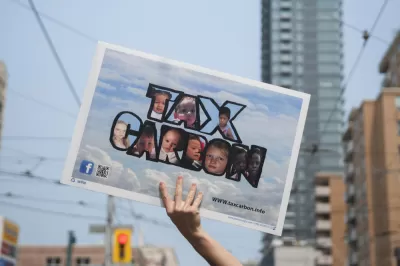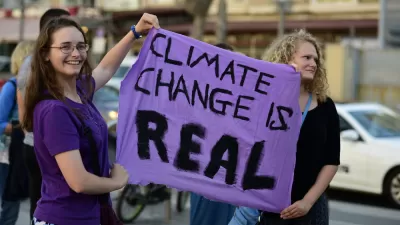New research suggests that cutting greenhouse gas emissions from the transportation sector would have tremendous benefits to public health.

The Transportation, Equity, Climate and Health (TRECH) project at the Center for Climate, Health, and the Global Environment of the Harvard T.H. Chan School of Public Health is a multi-university research initiative tasked with conducting an independent analysis of policy scenarios under consideration by the Transportation Climate Initiative (TCI) to address carbon pollution from the transportation sector.
The TCI is a collaboration between multiple Northeastern and Mid-Atlantic states to cut emissions from the transportation sector (Planetizen has been tracking the genesis of the TCI since 2018). To help decide a memorandum for TCI, "the TRECH Project team has estimated health outcomes for five illustrative TCI policy scenarios representing a range of emissions reduction caps and investment strategies," according to the TRECH website.
Here's a quick sample the key findings from TRECH's research, with a lot more detail, and a few more findings, provided in the source article.
- The estimated health benefits under the five TCI climate mitigation policy scenarios are substantial and are larger than estimated TCI program proceeds, for a subset of benefits examined.
- The TCI policy scenario with the largest estimated health benefits has the most ambitious emissions reduction cap and the largest share of investments dedicated to public transit and active mobility.
- Under all five policy scenarios, health benefits are estimated to occur in all counties across the region and are concentrated in more populated areas.
The article also explains and illustrates the five policy scenarios under examination.
FULL STORY: New TRECH Project Research Update on Health Benefits of TCI Policy Scenarios

Alabama: Trump Terminates Settlements for Black Communities Harmed By Raw Sewage
Trump deemed the landmark civil rights agreement “illegal DEI and environmental justice policy.”

Planetizen Federal Action Tracker
A weekly monitor of how Trump’s orders and actions are impacting planners and planning in America.

The 120 Year Old Tiny Home Villages That Sheltered San Francisco’s Earthquake Refugees
More than a century ago, San Francisco mobilized to house thousands of residents displaced by the 1906 earthquake. Could their strategy offer a model for the present?

In Both Crashes and Crime, Public Transportation is Far Safer than Driving
Contrary to popular assumptions, public transportation has far lower crash and crime rates than automobile travel. For safer communities, improve and encourage transit travel.

Report: Zoning Reforms Should Complement Nashville’s Ambitious Transit Plan
Without reform, restrictive zoning codes will limit the impact of the city’s planned transit expansion and could exclude some of the residents who depend on transit the most.

Judge Orders Release of Frozen IRA, IIJA Funding
The decision is a victory for environmental groups who charged that freezing funds for critical infrastructure and disaster response programs caused “real and irreparable harm” to communities.
Urban Design for Planners 1: Software Tools
This six-course series explores essential urban design concepts using open source software and equips planners with the tools they need to participate fully in the urban design process.
Planning for Universal Design
Learn the tools for implementing Universal Design in planning regulations.
Clanton & Associates, Inc.
Jessamine County Fiscal Court
Institute for Housing and Urban Development Studies (IHS)
City of Grandview
Harvard GSD Executive Education
Toledo-Lucas County Plan Commissions
Salt Lake City
NYU Wagner Graduate School of Public Service





























